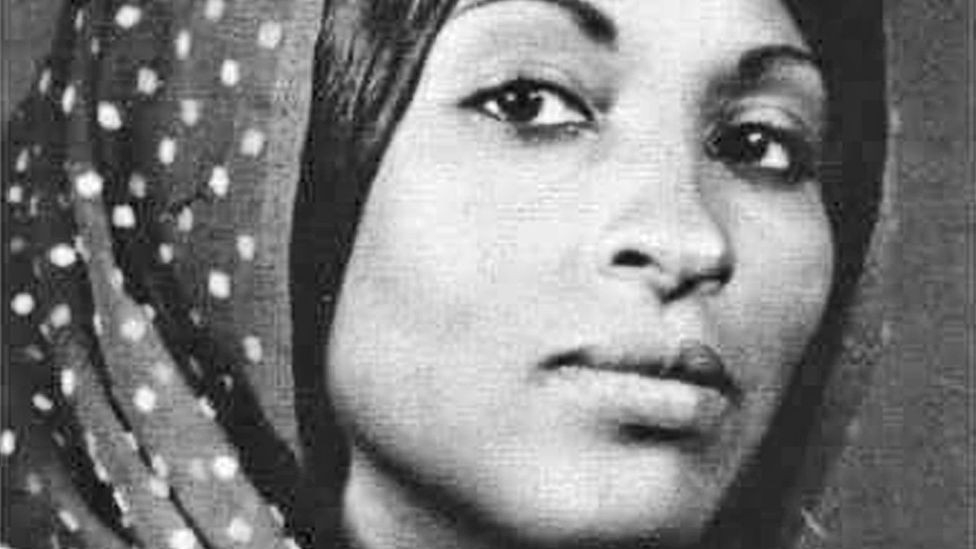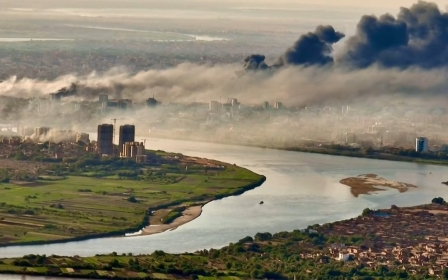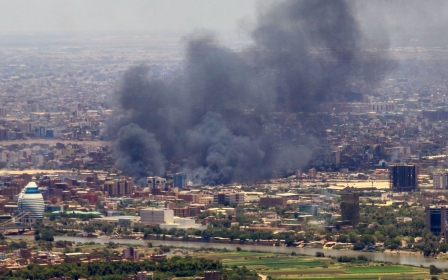Sudan: Iconic actor Asia Abdelmajid killed in Khartoum crossfire

Sudan's first professional female stage actor was killed in fighting in the north of Khartoum on Wednesday, according to the BBC.
Asia Abdelmajid, 80, was killed in a crossfire as the Sudanese army and the paramilitary Rapid Support Forces (RSF) continued their bloody conflict on the streets of Sudan's capital.
An acclaimed actor, Abdelmajid burst onto the scene in a 1965 production of the play Pamseeka, which was performed at the national theatre in Omdurman to mark the anniversary of Sudan's first revolution against a coup leader. She was considered a pioneer in her craft and later became a teacher.
Abdelmajid's family told the BBC she was buried just hours after her shooting on Wednesday morning in the grounds of a kindergarten where she had been most recently working.
It is not clear who fired the shot that killed her during ongoing clashes in the northern suburb of Bahri, or Khartoum North.
Stay informed with MEE's newsletters
Sign up to get the latest alerts, insights and analysis, starting with Turkey Unpacked
Sources on the ground in Khartoum told Middle East Eye that the RSF, led by General Mohamed Hamdan Dagalo, continues to dominate in Bahri, south and east Khartoum, and south Omdurman.
Footage emerged on Thursday of army soldiers celebrating in Khartoum North as they claimed victory over the RSF in the city. The army says it has been patrolling the area around Khartoum's airport, looking to flush out RSF fighters.
Eyewitnesses told MEE that there was still fighting around key strategic buildings in the airport district, including the army headquarters and the presidential palace. Sudanese Armed Forces (SAF) air strikes are ongoing, with an Egyptian military source telling MEE that Egyptian pilots are flying some of the planes.
Seeking to upset its rival's aerial supremacy, the RSF has reportedly taken in a new supply of man-portable air-defence systems, known as Mpads.
More than 500 people have been killed and over 4,000 injured since fighting broke out in Sudan on 15 April. About 334,000 people are estimated to have been internally displaced, and over 100,000 people have fled to neighbouring countries, according to the UN.
MEE yesterday revealed previously unreported details relating to the early hours of the fighting, including an RSF assault on the residence of SAF commander General Abdel Fattah al-Burhan, the timeline of attacks, and the seizure in March of large quantities of gold disguised as cookies on a Russian flight at Khartoum airport.
Dire humanitarian situation
As the fighting continues, the security and humanitarian situation in Khartoum and its twin city Omdurman is deteriorating.
Sources on the ground told MEE that banks and markets across Khartoum have been looted by gangs, some with the assistance of the RSF. Petrol stations are all out of service and most of the gold markets have been looted.
In Khartoum, 61 percent of health facilities are closed and only 16 percent are operating as normal, leaving millions of people without access to healthcare, the UN said. Residents of the city have told MEE about a serious shortage of affordable food and medicines.
Violence is ongoing in other parts of Sudan, including in Nyala, the capital of South Darfur, and Geneina, the capital of West Darfur.
The Norwegian Refugee Council (NRC) reported on Wednesday that at least 191 people had died in fighting in Geneina. The NRC also reported the "mass looting of aid".
Sources on the ground told MEE that a ceasefire in North Darfur was holding up. Elsewhere, particularly in the capital, ceasefires brokered by regional and international powers have not been maintained.
Cameron Hudson, a former CIA analyst and senior associate at the CSIS Africa Program, told MEE that the announcement of ceasefires had much to do with public relations.
“Both sides share an interest in creating an impression among the international community that they are cooperating with calls for ceasefires and that they are acting responsibly,” he said.
Middle East Eye delivers independent and unrivalled coverage and analysis of the Middle East, North Africa and beyond. To learn more about republishing this content and the associated fees, please fill out this form. More about MEE can be found here.





